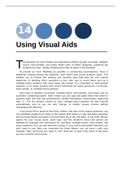Exam (elaborations)
COMM 110 Lucas11e_TB_Chapter14 Using Visual Aids
- Course
- Institution
Tclustered by topic, roughly following the order of topics in the textbook. To provide as much flexibility as possible in constructing examinations, there is deliberate overlap among the questions, both within and across question types. This enables you to choose the wording and question type th...
[Show more]



